A vocabulary assessment evaluates a person’s ability to recognize, define, and use words effectively, which is crucial for language proficiency, comprehension, and communication skills. If you are looking for online assessment platforms to test vocabulary knowledge of your students, here are the top 8 vocabulary quiz maker tools to consider.
- Why Vocabulary Assessments Are Important?
- Types of Vocabulary Assessments
- 8 Best Vocabulary Knowledge Assessment Platforms for Language Training
- Vocabulary Assessment Tools FAQ
Why Vocabulary Assessments Are Important?
Vocabulary assessments play a crucial role in the process of language learning for several reasons:
1. Gauges Proficiency: Vocabulary size and mastery is a strong indicator of a learner’s language proficiency. By assessing vocabulary, educators can determine the learner’s overall language comprehension and communicative ability.
2. Identifies Gaps: Through vocabulary assessment, educators can pinpoint which words or phrases learners struggle with, enabling targeted instruction to address these gaps.
3. Motivation and Feedback: Regular assessments provide learners with feedback on their progress, which can motivate them to study more diligently. Recognizing areas of improvement can be encouraging for learners.
4. Guides Curriculum Design: Educators can design or adjust their teaching material based on vocabulary assessment results. For example, if learners consistently struggle with certain word categories or themes, more instructional time can be dedicated to those areas.
5. Promotes Retention: The very act of being tested can reinforce memory. When learners know they’ll be assessed, they’re more likely to engage in active recall, strengthening their retention of vocabulary.
6. Skills Development: Vocabulary assessment doesn’t just test rote memorization. Depending on the assessment format, it can also measure a learner’s ability to use vocabulary in context, deduce meaning from context, or recognize synonyms and antonyms, all of which are valuable language skills.
7. Provides Benchmarks: Vocabulary assessments allow educators and learners to set benchmarks or standards. These benchmarks can be used to determine if a learner is ready to advance to more complex language materials or needs further review.
8. Facilitates Personalized Learning: Different learners may struggle with different vocabulary sets. Regular assessments enable educators to tailor instruction to individual needs, ensuring that each learner receives support in areas where they’re most challenged.
Just to let you know
Sign up for a free OnlineExamMaker account to create an interactive online vocabulary assessment in minutes – automatic grading & mobile friendly.
Types of Vocabulary Assessments
There are several types of vocabulary assessments, each designed to measure different aspects of vocabulary knowledge, from word recognition to deeper understanding.
Recognition Vocabulary Assessments
These assess a learner’s ability to recognize words and their meanings. These are often receptive in nature, meaning the learner doesn’t necessarily need to use the word actively, but needs to recognize its meaning or correct usage.
Productive Vocabulary Assessments
These require learners to actively use the vocabulary either in writing or speaking, showing their ability to retrieve words from memory and apply them appropriately.
Fill-in-the-blank: Learners complete sentences by filling in missing words based on context.
Sentence writing: Learners write a sentence using the target vocabulary word.
Speaking tasks: Learners are asked to use specific words in speech, such as in a presentation, dialogue, or spontaneous discussion.
Word formation: Learners are asked to generate different forms of a word (e.g., verb to noun).
Contextual Vocabulary Assessments
These assess the ability to determine word meanings or correct usage based on context. This helps evaluate the learner’s ability to infer meaning from text or conversation.
Context clue exercises: Learners read a sentence or passage and infer the meaning of unfamiliar words from context.
Cloze tests: Similar to gap-fill exercises, but words are removed from a passage and learners need to fill them in based on the overall meaning of the text.
Depth of Vocabulary Knowledge Assessments
These assess not just whether a learner knows a word, but how well they know it. Depth refers to knowing a word’s multiple meanings, collocations, word forms, and nuances.
Self-Assessment Vocabulary Tools
These assessments allow learners to evaluate their own vocabulary knowledge, often used to reflect on their progress or guide further study.
Vocabulary size test: Learners estimate the size of their vocabulary based on a sample of words.
Self-rating Checklists: Learners rate their familiarity or confidence with specific words or word groups.
8 Best Vocabulary Knowledge Assessment Platforms for Language Training
- 1. OnlineExamMaker
- 2. Quizlet
- 3. Vocabulary.com
- 4. Cram
- 5. Memrise
- 6. ProProfs
- 7. Brainscape
- 8. Kahoot!
1. OnlineExamMaker
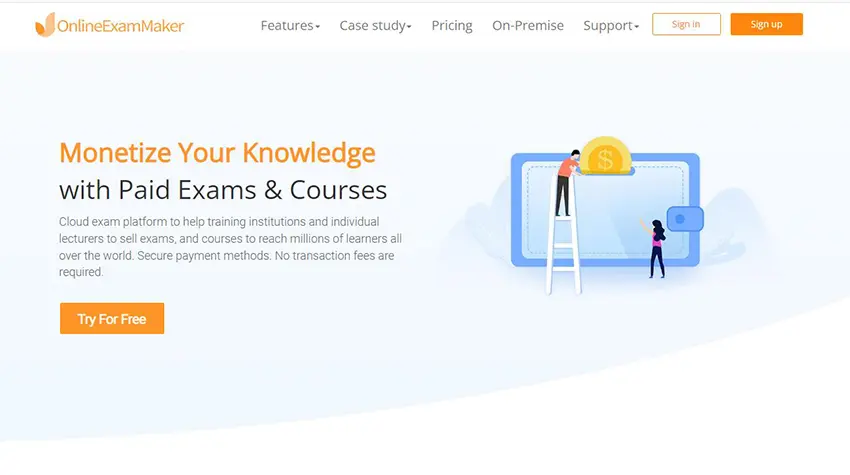
OnlineExamMaker is an easy-to-use online assessment platform that helps students enhance their vocabulary through rigorous testing. Its user-friendly design enables learners to select their grade level and then take vocabulary tests tailored to that level.
With a powerful online Question Editor, OnlineExamMaker enables teachers add video or audio into vocabulary quiz questions to deliver interactive testing experience to students. Further more, exam takers are allowed to answer a vocabulary question by uploading attachment files, or speak to answer.
What make OnlineExamMaker outstanding?
✔ AI Question Generator helps teachers create vocabulary questions more efficiently.
✔ Support up to 10 different types of questions, including essay, multiple choice, true-false and more.
✔ The order of sections, pages, questions and choices in the exam is shuffled.
✔ The lockdown browser will enforce users to move into fullscreen mode before starting the test.
✔ Import multiple candidates from their computers to a group using the import excel feature.
Create Your Next Quiz/Exam with OnlineExamMaker
Learn more about creating an online assessment :
- 7 Best Math Assessment Software for Mathematics Teachers
- Top 10 Online Exam Monitoring Software for Remote Assessments
- How to Use Online Assessment Software in Microlearning?
2. Quizlet
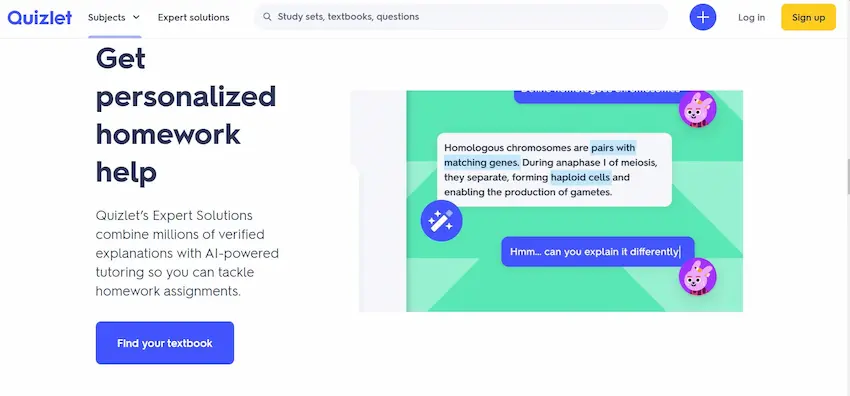
Quizlet is a popular tool for students and educators, offering a platform to create flashcards, quizzes, and games. While it’s versatile enough to cover any subject, its functionality for vocabulary learning and assessment is particularly strong. Users can access a vast array of shared vocabulary sets or create their own tailored lists.
Key Features:
✔ Create personalized flashcards for vocabulary.
✔ Engage in games like “Gravity” and “Match.”
✔ Access vast collections of user-generated content.
✔ Hear words to aid pronunciation.
✔ Test, write, or spell vocabulary.
✔ Share the quiz result and learning path with peers.
3. Vocabulary.com
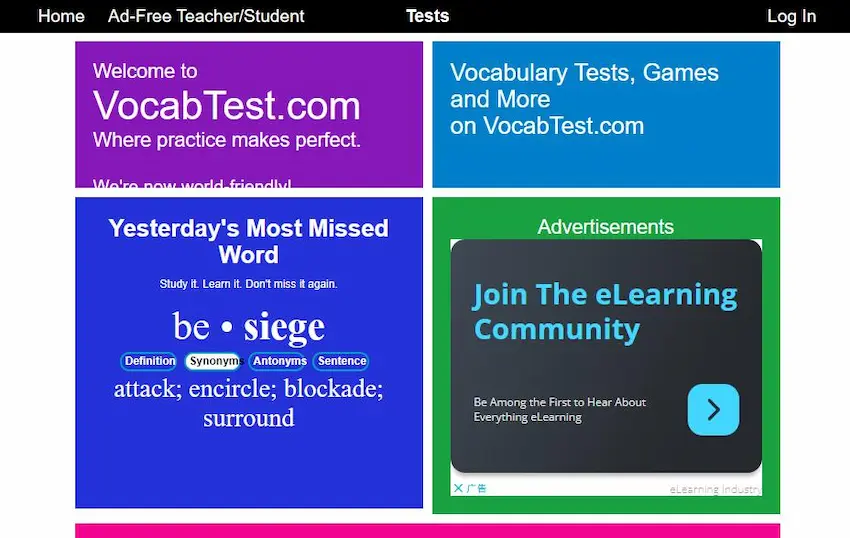
Vocabulary.com offers a dynamic approach to vocabulary enhancement. Through its adaptive learning system, users are quizzed and taught words based on their individual needs. The platform also boasts a dictionary and a challenge feature, where users can compete against one another.
Key Features:
✔ Improve vocabulary in a scientific and fun way.
✔ Compete against others in vocabulary games.
✔ Tailor lists for specific study or curriculum needs.
✔ Get instant results and explanations.
✔ Motivate learning with rewards and customized quiz certificate.
4. Cram
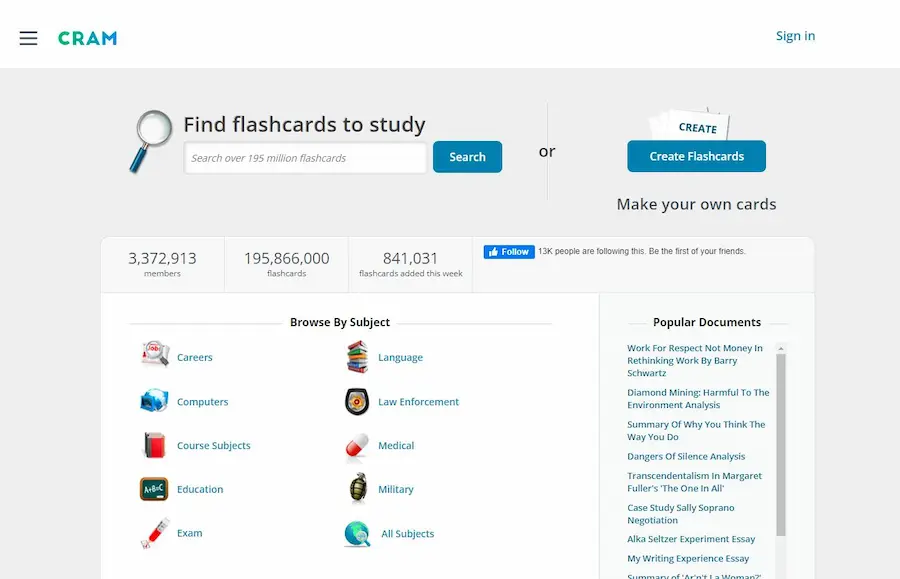
Cram provides an interactive platform for flashcards. While it encompasses various subjects, vocabulary remains a primary focus. The site allows users to create their own flashcards or leverage existing ones. Its “Test” mode provides an effective way to assess vocabulary comprehension.
Key Features:
✔ Pick unique writing themes and discussions through essay questions.
✔ Support multiple question types: Multiple choice, true/false, and written word tests.
✔ Add sound to flashcards for pronunciation help.
✔ Study vocabulary without internet connection.
✔ Learn on-the-go with Android and iOS applications.
5. Memrise
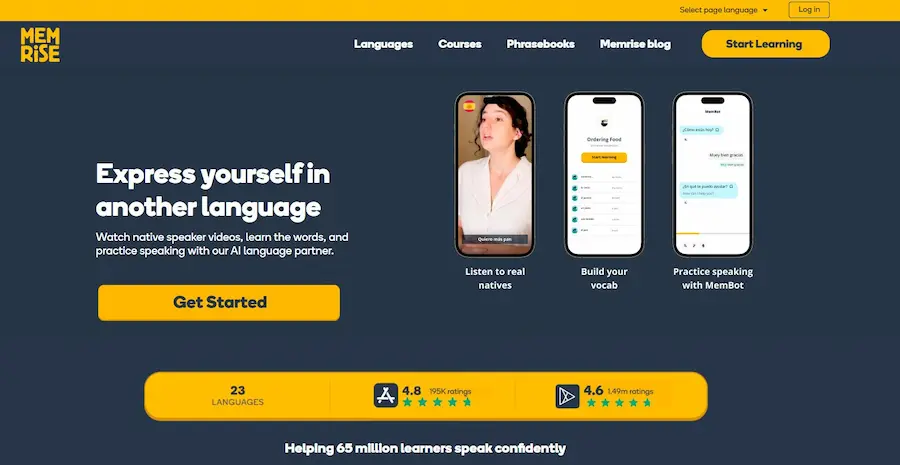
Memrise uses spaced repetition and mnemonic techniques to enhance vocabulary learning. Catering to multiple languages, its assessment techniques ensure that learners remember and recall words effectively. The platform’s visually engaging and interactive approach makes learning and assessment enjoyable.
Key Features:
✔ Learn from a wordlist based on what you actually want to learn.
✔ Smart visual aids and memory tricks for learning.
✔ Real-life context and pronunciation guides.
✔ Assess vocabulary with timely reviews.
✔ Diverse vocabulary learning content from global users.
✔ Immerse yourself in videos of native speakers.
6. ProProfs Quiz Maker

ProProfs Quiz Maker offers an extensive platform for quiz creation, making it suitable for vocabulary assessments. Teachers can create timed quizzes, offer instant feedback, and even incorporate multimedia elements to enhance the learning experience.
Key Features:
✔ Personalize your quizzes by adding your organization’s logo, colors, and fonts.
✔ Immediate assessment results and explanations for users.
✔ Multimedia Integration: Embed images, videos, and more.
✔ Set time limits to force students to submit the paperc.
✔ Create vocabulary questions with AI technology.
✔ Utilize pre-made quiz templates for quick quiz creation.
7. Brainscape
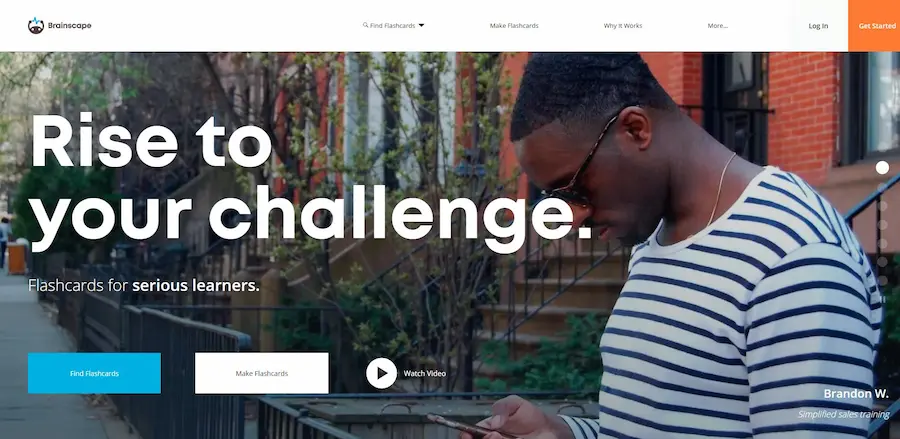
Brainscape’s cognitive science approach to flashcard learning makes it a potent tool for vocabulary acquisition and assessment. Using spaced repetition, learners are exposed to words at optimal intervals to ensure retention. Users can create their own decks or use shared ones.
Key Features:
✔ Enable students learn unlimited flashcards online.
✔ Spaced Repetition Algorithm: Optimized recall intervals for retention.
✔ Share and co-create flashcards with others.
✔ Audio Integration: Enhance cards with sound for pronunciation.
✔ Accessible via web and mobile applications.
8. Kahoot!
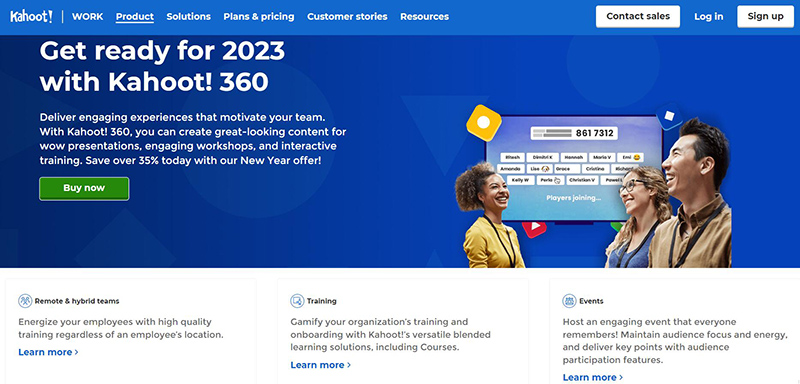
While Kahoot! is versatile enough for various subjects, its game-based approach can be applied effectively to vocabulary assessments. Teachers can create interactive quizzes where students compete in real-time, making vocabulary testing engaging and competitive.
Each of these platforms offers unique features and methods for vocabulary learning and assessment. The best choice would depend on the specific needs and preferences of both educators and learners.
Key Features:
✔ Kahoot! infuses excitement into quizzes through game-based elements, fostering engagement and motivation.
✔ Create interactive Kahoot style vocabulary quizzes with images, videos, and music.
✔ Simply share released quizzes to social platforms.
✔ Collaboration and team play options for group activities and cooperative learning.
✔ Time limits and countdowns for adding excitement and challenge to quizzes.
✔ Customizable certificates and rewards for acknowledging achievements.
Vocabulary Assessment Tools FAQ
What are vocabulary assessment tools?
Vocabulary assessment tools are instruments used to measure a learner’s vocabulary knowledge, including word meaning, word usage, and word recognition. These assessments can be used for diagnostic purposes, progress tracking, and to guide instruction in language learning.
What is the difference between receptive and productive vocabulary?
● Receptive vocabulary refers to words that a learner can recognize and understand when encountered in listening or reading contexts.
● Productive vocabulary refers to words that a learner can use correctly in speaking or writing.
How are vocabulary assessment results used?
● Identify gaps in vocabulary knowledge.
● Guide individualized learning plans.
● Inform teaching strategies.
● Track student progress over time.
● Prepare learners for standardized tests.
Can vocabulary assessments be done online?
Yes, many vocabulary assessments are available online, including interactive tools and apps that adapt to the learner’s level. These tools provide immediate feedback and are often used in both classroom and home settings. If you want to prevent cheating during the test, you can choose assessment maker software with webcam proctoring features, such as OnlineExamMaker or TestInvite.
What should teachers consider when choosing a vocabulary assessment tool?
● The age and language level of the students.
● The purpose of the assessment (diagnostic, formative, or summative).
● Whether the tool assesses both receptive and productive vocabulary.
● How the results will be used to inform instruction.
How can vocabulary assessment results be shared with parents and guardians?
Teachers can share results through progress reports, parent-teacher conferences, or written summaries that explain the child’s vocabulary strengths and areas for improvement, along with suggestions for vocabulary-building activities at home.